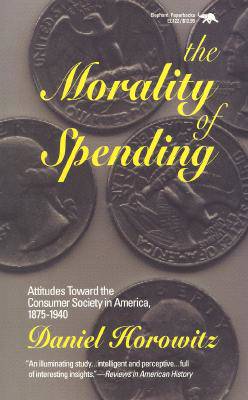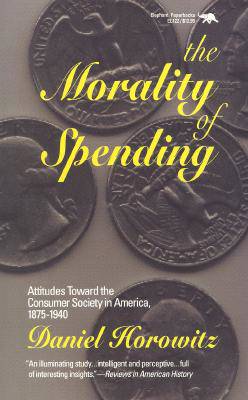
- Afhalen na 1 uur in een winkel met voorraad
- Gratis thuislevering in België vanaf € 30
- Ruim aanbod met 7 miljoen producten
- Afhalen na 1 uur in een winkel met voorraad
- Gratis thuislevering in België vanaf € 30
- Ruim aanbod met 7 miljoen producten
Zoeken
The Morality of Spending
Attitudes Toward the Consumer Society in America 1875-1940
Daniel Horowitz
Paperback | Engels
€ 13,95
+ 27 punten
Omschrijving
"For centuries," Daniel Horowitz writes, "Americans have worried about the consequences of comfort, affluence, and luxury. They have often greeted a rising standard of living with a mixture of pleasure and disquiet. Anxious about the impact of ease on the commitment to hard work, savings, and self-control, and ambivalent about the implications of increased wealth, many in the United States have expressed concern about new levels and kinds of consumption. This book traces the development of such misgivings." "Clear, judicious, thorough and unfailingly interesting; a solid work on a most significant topic."--Technology and Culture. "An illuminating study...intelligent and perceptive...full of interesting insights."--Reviews in American History. "Daniel Horowitz has made creative use of diverse sources in order to integrate several fascinating strands of American cultural history.... His findings have broad implications...."--American Historical Review. "An imaginative and carefully researched study.... The Morality of Spending accomplishes what it sets out to do: not a sociology of money but a history of ideas about money."--Journal of Social History.
Specificaties
Betrokkenen
- Auteur(s):
- Uitgeverij:
Inhoud
- Aantal bladzijden:
- 288
- Taal:
- Engels
Eigenschappen
- Productcode (EAN):
- 9780929587776
- Verschijningsdatum:
- 1/02/1992
- Uitvoering:
- Paperback
- Formaat:
- Trade paperback (VS)
- Afmetingen:
- 141 mm x 222 mm
- Gewicht:
- 349 g

Alleen bij Standaard Boekhandel
+ 27 punten op je klantenkaart van Standaard Boekhandel
Beoordelingen
We publiceren alleen reviews die voldoen aan de voorwaarden voor reviews. Bekijk onze voorwaarden voor reviews.











